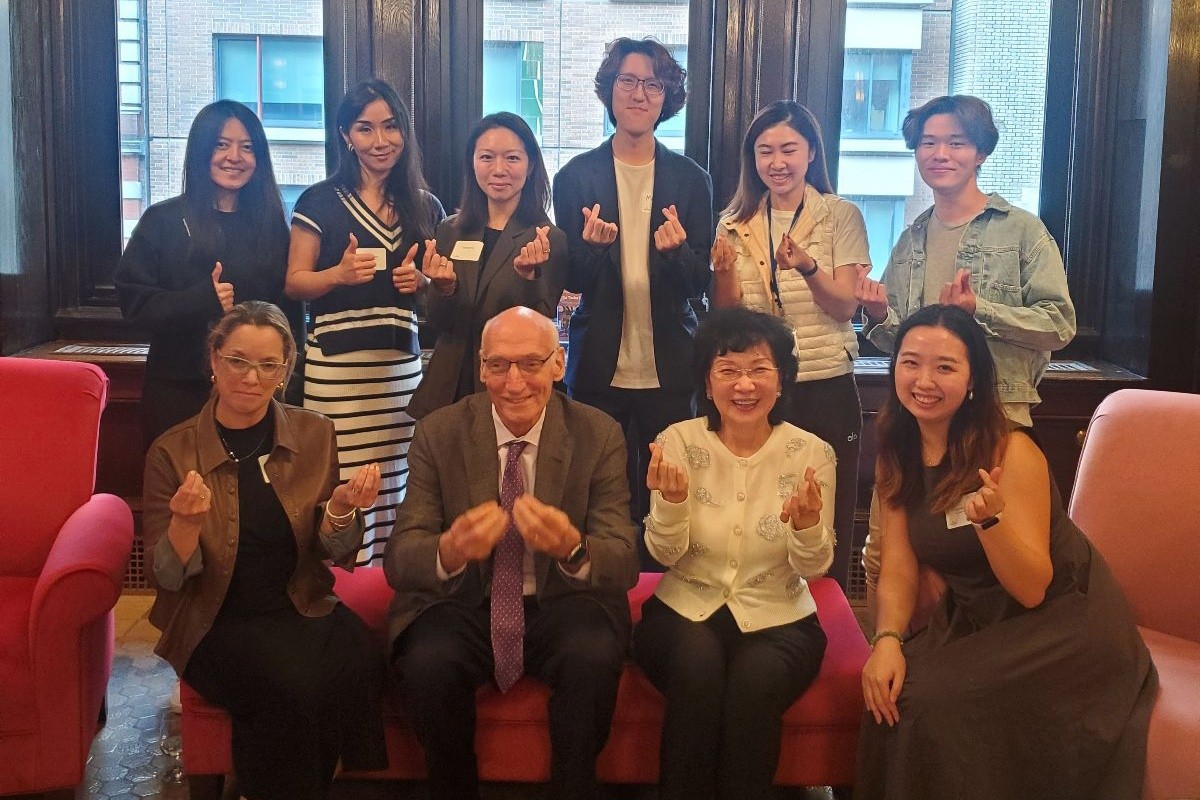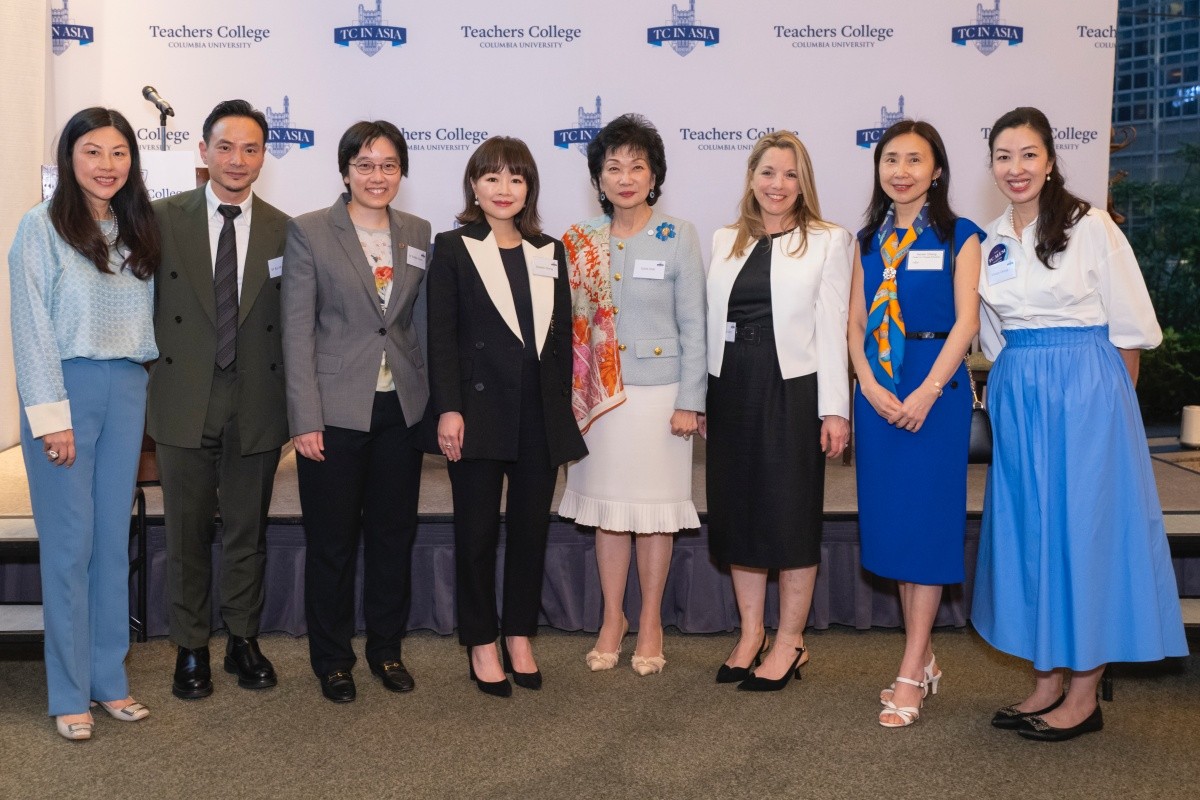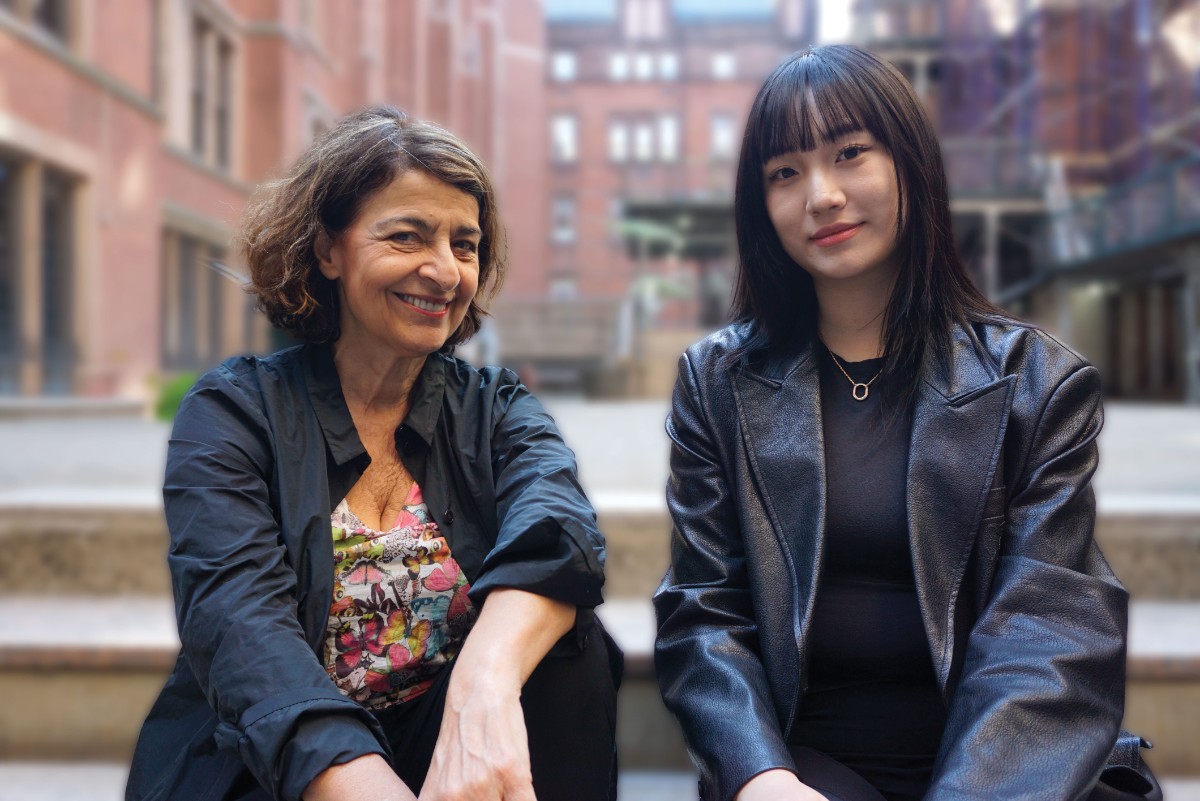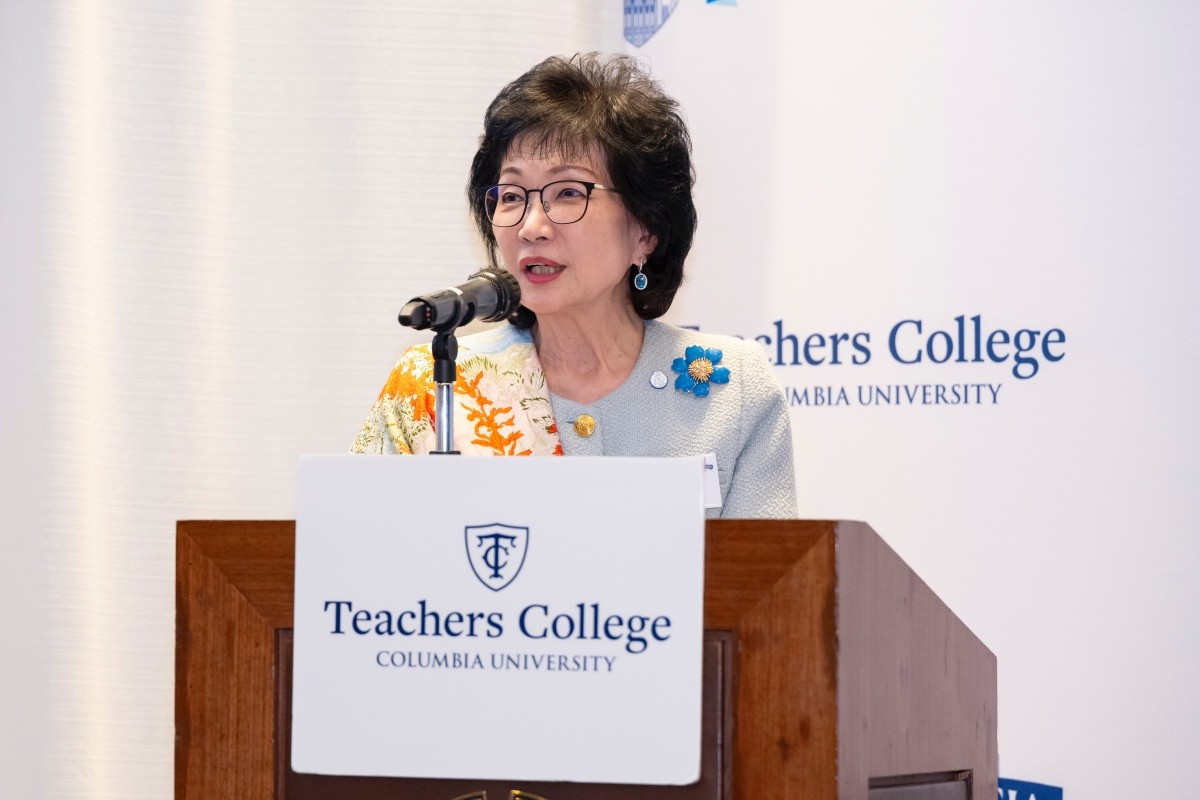Scientists say that a pebble dropped in a calm pond causes ripples far beyond what can be seen with the naked eye. Such is the case for catalysts like Trustee Edith Shih (Ed.M. '78, M.A. '77), whose impact can be felt from New York to Hong Kong — where she has cultivated a community of Teachers College alumni who turn to her for support and guidance as they navigate their own journeys.
“Edith is always asking, ‘How can I help?’ and then rolling up her sleeves to make it happen,” says friend and fellow TC alumna Vivian Chung (M.A. ’04). “From mentoring young graduates to rallying alumni around TC’s mission, she ensures our community isn’t just connected, but alive with purpose…She embodies the idea that impact isn’t measured in accolades, but in the lives you uplift.”
Now, Shih is the Executive Director and Corporate Secretary at CK Hutchison Holdings, a Fortune 500 company. And though Shih graduated from Teachers College in the ’70s with degrees in TESOL and Applied Linguistics before embarking on a robust law career, one might appreciate that she never fully left.

Shih Scholars gather on campus with Edith Shih (front row, second from right), President Thomas Bailey (second from left) and Roberta W. Albert (M.A. ’97), Vice President for Institutional Advancement (front row, left).
Her memories playing Beethoven duets with her classmates on the piano in Whittier Hall remain vivid. Her time as a TESOL teaching assistant taught her how to be a “better listener and collaborator” throughout her career. Years later, when New York City’s front-line medical professionals didn’t have access to personal protective equipment (PPE) at the beginning of the COVID-19 pandemic, Shih teamed up with numerous Columbia University alumni in Asia to send millions of PPE items to medical centers in New York, New Jersey and Massachusetts, as well as TC and Columbia — enlisting TC students to help.
And so when Shih established multiple scholarships to support master’s and doctoral students from Asia in 2012, she embarked on a journey that has now supported more than 30 alumni and current students in building careers of purpose with limitless possibilities.
“A donor doesn’t want to just give money,” explains Shih, the former President of the Columbia University Alumni Association of Hong Kong, whose volunteer leadership extends to the Hong Kong University of Science and Technology, the English Schools Foundation and the Hong Kong Chartered Governance Institute.

Shih and College leadership convened alumni, students and friends at a March reception in Hong Kong. Pictured from left to right: Columbia Business School alumna Anita Ma (’99); panelist Kai Wai Hou; panelist Esther Chan (M.A. ’09); panelist and Columbia University alumna Jennifer Yu Cheng (’03); Shih; Albert; Henan Cheng (Ed.D. ’10); and Vivian Chung (M.A. ’04). (Photo: Anthony Liu)
“I want to bring scholars along and open doors, and many donors are very prepared to walk along with them,” says Shih, who has served on the TC Board of Trustees since 2010. “We learn from the scholars too.”
With Shih’s support, TC student scholars gain access to the tools they need to make a difference through their TC education — compounding change alongside faculty and colleagues in research labs, classrooms and more.
Cascading Impact for Students & Beyond
Support as an international student was essential for Tianyu Feng (M.A. '26) during her undergraduate years in Los Angeles amid the pandemic. Now a recipient of the Edith Shih Endowed Scholarship in TC’s International & Comparative Education program, Feng aims to advance social-emotional learning resources for students back home in rural China and for international students like herself.
“Overcoming my personal struggle has given me a deep understanding of the importance of mental health support in educational settings,” explains Feng, who hopes to establish her own nonprofit one day and sees culturally-sensitive support resources in China as essential. “Receiving the Edith Shih Scholarship is not just an honor but a reinforcement of my dedication to education as a means of social change.”
At TC, Feng has been profoundly influenced by her adviser Gita Steiner-Khamsi, the William Heard Kilpatrick Professor of Comparative Education. A leading scholar on education policy in developing countries, Steiner-Khamsi has expanded the worldview of students like Feng in order to prepare them for data-driven scholarship that “amplifies the voices” of underserved youth.

Gita Steiner-Khamsi, the William Heard Kilpatrick Professor of Comparative Education, with student and Shih Scholar Tianyu Feng (M.A. ’26). (Photo: Hua-Chu Yen)
In planning to return to China to strengthen social-emotional learning in rural communities, Feng is part of a generation of students helping realize a key component of Steiner-Khamsi’s work. As part of her efforts with the United Nations Educational Scientific and Cultural Organization (UNESCO), Steiner-Khamsi is focused on helping developing countries build the capacity for locally led education policy and planning — the key indicator between countries that have more effective education systems versus those that don't.
“It's usually experts — American experts — who say what is needed in poor countries,” explains Steiner-Khamsi, who, in addition to her professorship, serves as UNESCO’s first Chair in Comparative Education Policy. “Local experts should be able to document with data what the needs are in their country.”
Many of my students hope to take what they learn in my classroom and translate it into reform and teachings when they return to their own countries.
For Steiner-Khamsi and the next generation of international education scholars, fostering local capacity for education policy reform is about more than who is doing the work; it’s about supporting scholars equipped to embrace the complexity of local challenges in order to develop effective solutions.
“Many of my students hope to take what they learn in my classroom and translate it into reform and teachings when they return to their own countries. I try to bring TC to the world and the world to TC.”
Exponential Results for Fellow Alumni
In the short time since she graduated from Teachers College, Shih Scholar Sitara Maria (M.A. '21, Clinical Psychology) has already meaningfully advanced patient care in New York City. Through her work at the boutique consulting firm HCLS Consulting, Maria develops and implements strategic solutions to complex challenges at both the systemic and patient levels — advancing equitable access to mental health care for New Yorkers while reinforcing ethical and sustainable business models for providers. Her work centers on the critical intersection of medicine and mental health, with a particular emphasis on chronic disease management and its profound interplay with behavioral health.
Consider, for example, a patient presenting with shortness of breath and chest tightness While a traditional approach would exclusively assess medical causes, New York State’s Collaborative Care Model integrates behavioral health assessments at the outset. This holistic approach enables clinicians to connect patients not only with appropriate medical treatment but also with a mental healthcare team under Maria’s purview.
“By embedding behavioral health within medical practices, we're normalizing these conversations and making care more accessible,” explains Maria, noting that the program often serves underserved populations, such as patients insured by Medicaid or from the migrant community. “I go to sleep at night thinking that I’m making a difference, and that impact fuels my drive to keep moving forward.”

Shih Scholar Sitara Maria (M.A. ’21, Clinical Psychology). (Photo courtesy of Maria)
But Maria’s keeping her focus on what’s ahead as she plays a key role in HCLS’s expansion to New Jersey and California — major milestones just four years after Maria was one of the firm’s first few employees. At the time, as she graduated from TC in the middle of the pandemic, joining an emerging company felt like a risk.
“Maybe I get some of that from TC — the courage to take a chance, whether it's betting on yourself or betting on things that you believe in. And I think I did a little bit of both,” says Maria.
A Clinical Psychology graduate from New Delhi, Maria credits the Edith Shih Endowed Scholarship with empowering her to study at the College — where an emphasis on statistical analysis and critical thinking created a launchpad for her future career. Maria continues to pinpoint the pain points healthcare professionals face and is currently focused on developing solutions around these challenges, with a primary emphasis on leveraging data to drive impactful change. On the weekends, she is working to build something at the intersection of data and mental health and is open to conversations about these efforts. Her work at TC’s Global Mental Health Lab — which dismantles barriers to care in underserved communities across the world through research and service — imparted the core principles that inform the scholar’s efforts here in New York City.
Maybe I get some of that from TC — the courage to take a chance, whether it's betting on yourself or betting on things that you believe in.
“The only way to do this work is through guidance from local teams,” explains TC’s Lena Verdeli, Founder and Director of the Global Mental Health Lab, and Associate Professor of Psychology & Education. At the Lab, Verdeli leads students in hands-on projects that emphasize collaborative learning.
“We train our students to come from a space of cultural humility, and learn from the expertise of the community members and their allies regardless of their level of education. It's these kinds of partnerships that can create sustainable and sustaining care.”
For Maria, this approach to building sustaining solutions that respond to community needs is a critical pivot for more traditional healthcare models. “Ideas often stay in academia when they actually need to be in industry,” says Maria, who finds the robust inquiry and critical thinking skills instilled in her at TC as essential in helping her tackle the most difficult of questions related to improving patient care. “Those classes profoundly shaped the way I see and approach the world.”
For Verdeli, watching students like Maria implement core principles in distinct ways embodies the full life-cycle of the work. “It makes me feel that the impact the Lab’s work has on the communities around the world is multiplied. And it takes on a life of its own,” reflects Verdeli, who, like her colleagues and donors like Shih, is part of an exponential cycle that defines the TC community itself.
“My students will be the next generation of mental health professionals, trainers, researchers and leaders,” says Verdeli. “They’ll make their own discoveries.” Like a pebble dropped in a pool of water, these ripples are felt near and far — across individuals and throughout their lives.
